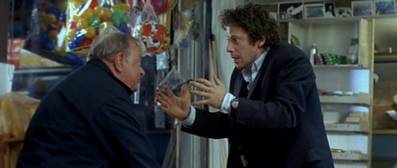|
A
few years ago I was involved in arranging a cinema screening
of Arnaud Desplechin's Ma Vie Sexuelle for a sizeable audience with a fondness for European cinema.
For those who haven't seen it, it's a long film – it's actually two minutes
short of three hours – and consists mostly of talk, about
philosophy, about friendship, about men and women, and about
moving apartments, something that was starting to figure
in a lot of French cinema of the time. Spooling the film
up for the screening we were, because of its length, forced
to divide it into two uneven halves, with a break two-thirds
of the way in to change reels, giving the audience a chance to stretch
their legs and grab a drink from the bar next door. In an
interesting barometer of reaction, something like thirty
percent of that audience did not return from the break.
Many of the others were huffing and raising their eyebrows. Just recently, following the film's UK DVD release, I read
one review that described it as a modern French classic,
a reaction I and most of that audience would have trouble
even comprehending let alone agreeing with. The film offered
its share of very real pleasures, but in some ways was the
essence of post My Dinner With Andre armchair
intellectualism, where much is discussed but little is
actually done, and if the conversation is conducted in French
(or English with a New York twang) then all the better.
A very different but interesting reaction on the IMDB carried
the headline "French cinema in decline." Hmmm.
I
thus approached Desplechin's latest film, Kings
and Queen [Rois et reine], with
just a hint of apprehension but nonetheless some optimism,
certainly more than my friend who, on seeing the DVD cover
and realising who the director was, groaned "Oh God."
Yep, he was at that screening. "How long is it?"
he then asked. "146 minutes," I told him. "Oh
God," he repeated. "Who's in it?" "Mathieu
Amalric." "Oh God." A very clear pattern
was emerging.

But
wait up, the movie begins and I'm instantly intrigued, as
we are introduced to art gallery director Nora (Emmanuelle
Devos) and her almost idyllically happy life and just know
that in a film lasting two and a half hours that this is
a prelude to darker times. It happens with disarming swiftness,
as the father she dotes on tells her that he has found blood
in his stools. It's a symptom of an ulcer Nora assures him, but
a few minutes later an exploratory operation has been performed
and Nora is being told of the cancer that is eating away
at her father and that he has only a few days to live. The point
of view here is crucial, as the short but devastating illness
that follows is shown not in how it physically destroys its
victim, but how it emotionally affects his daughter. Prefaced
as 'Nora's story', this chapter title is, in this respect,
as good as its word. As the illness takes hold, more details
of Nora's past are revealed, of her young son Elias and
the man who fathered him, who we know died before the child
was born, but not how. This one Desplechin saves for later
and with good reason, as the circumstances have considerable
bearing on Nora's past and present emotional state, as well
as her relationship with her father, which is not what it
seems either to us or to her.
But
running alongside Nora's story is that of manic-depressive
violinist Ismaël (Mathieu Amalric), whom we first meet
as two large men from a local psychiatric hospital knock
on his door and, after an entertainingly heated exchange,
haul him off to the rubber room. Trapped within its walls
and openly hostile to his psychiatrist (Catherine Deneuve),
he has to resort to playing dominoes with patients to procure
the money he needs to phone his lawyer, who is wildly enthusiastic
at his committal and believes that they can use as an argument
in court in the case of Ismaël's mounting debts.
We
are invited to draw direct parallels between the two tales
by virtue of some fabulous transitional editing – the early switch from Ismaël battling with five orderlies
who are attempting to strap him down to the conclusion of
Nora's father's exploratory operation is so seamless that
you need a second viewing to spot where one scene ends and
the other begins. It is only through almost throwaway lines
that we learn that Ismaël is Nora's ex-lover and that
the boy "he took care of" for so long was Nora's
son. Eventually, inevitably, the two stories cross over,
but both are at their most interesting in isolation, as
Nora, the queen of the title, recalls more about her relationship
with the men of her past (the kings), her back-story increasing
in complexity as the film progresses, and climaxing with
a genuinely painful discovery of how she is viewed by one
of them.

Overlong
and sometimes a little ramshackle it may seem, with talk that intermittently threatens to mutate into waffle, but for the most
part the length is justified through inventive storytelling
and fine performances. Nora's distress and at one point
heartrending grief is powerfully conveyed by Emmanuelle Devos,
while the aforementioned Mathieu Amalric's beady-eyed twitchiness
fires up scenes that could otherwise have fallen flat. Seemingly
deliberate in its tonal unevenness, echoed in the eclectic
music score and Godardian use of jump-cut editing, it
wanders from the dramatic to the tragic to scenes of almost
slapstick comedy (usually featuring Ismaël, though
in one riotous scene involving a botched store robbery it's
his father who steals the show). But for the most part there
is eventual purpose to these stylistic shifts, with the
almost sickly sweetness of Nora's daydream of her dead ex-lover's
return nicely undercut later by the brutal truth and consequences
of his death.
Given
Desplechin's approach, it comes as no surprise that not everything
works, but when it does it's something to see. There is
real pleasure to be gained just from the rich layering and
the intricate way the stories and back-stories unfold, and
Devos' performance is almost worth the price of admission
alone.
So,
given my opening statements, is it hat-eating time for Slarek?
Well, I don't know, but on the basis of how much I enjoyed
Kings and Queen, I'd almost be willing
to give Ma Vie Sexuelle another go...
2.35:1
and anamorphically enhanced, this is a very pleasing transfer
that reproduces the film's gentle colour palette well as
has a nicely 'filmic' quality. Sharpness is largely good,
and black levels and contrast appear solid. The picture
never leaps from the screen, but was clearly not shot with
that intention.
Sound
is Dolby 2.0 stereo and does the job well enough – it's
clear, there is reasonable separation – and though the score
may have benefited sonically from a 5.1 mix, whether it
would have suited the tone of film is another matter.
Interview
with Mathieu Amalric & Hyppolite Giradot (19:09) has the two actors (who play Ismaël and his
lawyer Maître Marc Mamanne) in conversation about
working on the film and with director Desplechin, shot handheld
with two cameras, with their words sometimes directed at
an unseen and unheard interviewer. Extracts from the film
pepper the talk, which is presented in non-anamorphic 16:9.
It's somewhat unstructured but interesting and conducted in French with
clear, removable English subtitles.
The
Interview with Arnaud Desplechin
(29:55) is in English, framed 4:3 and more formal in presentation
than the previous interview. The very audible hum on the
soundtrack that had me leaping to switch of the bass-to-subwoofer
redirection, and occasional DV motion glitches and a few
audio blips did not detract from what is an enjoyable and
informative chat about influences (Bergman, Hitchcock's
Notorious, Polanski's Tess
amongst others), intentions and his approach to the film,
some (though not all) extracts of which are squished up
to 16:9. Advice to those who filmed this piece – switch
the camera's autofocus off next time.
Biographies
& Filmography feature selected filmographies
for Mathieu Amalric, Arnaud Desplechin and Emmanuelle Devos.
There is a brief biography for Desplechin.
Probably
as good an example as I've seen all year of why you should
take each film as you find it and not be influenced by what
you've seen before from the same film-maker, Kings
and Queen is a cleverly constructed, very nicely
played and thoroughly engaging work that despite its length
hops forward at a brisk pace and hits far more frequently
than it misses.
Artificial
Eye's DVD showcases the film well and benefits from an interesting
if technically problematic interview with the director,
though it does make you pine a little for a commentary track.
For the film alone, it comes nonetheless recommended. It
would appear that reports of the decline of French cinema
were somewhat premature.
|